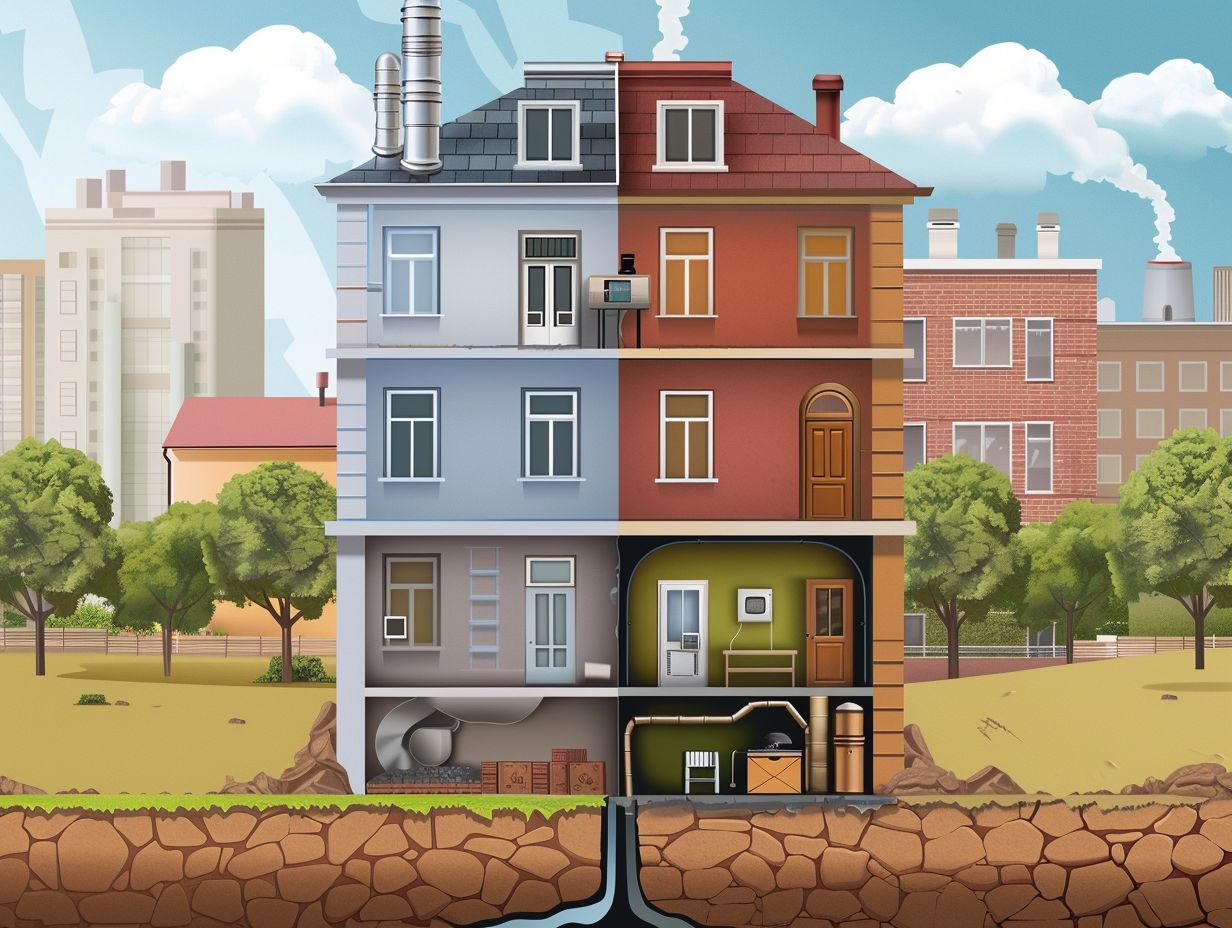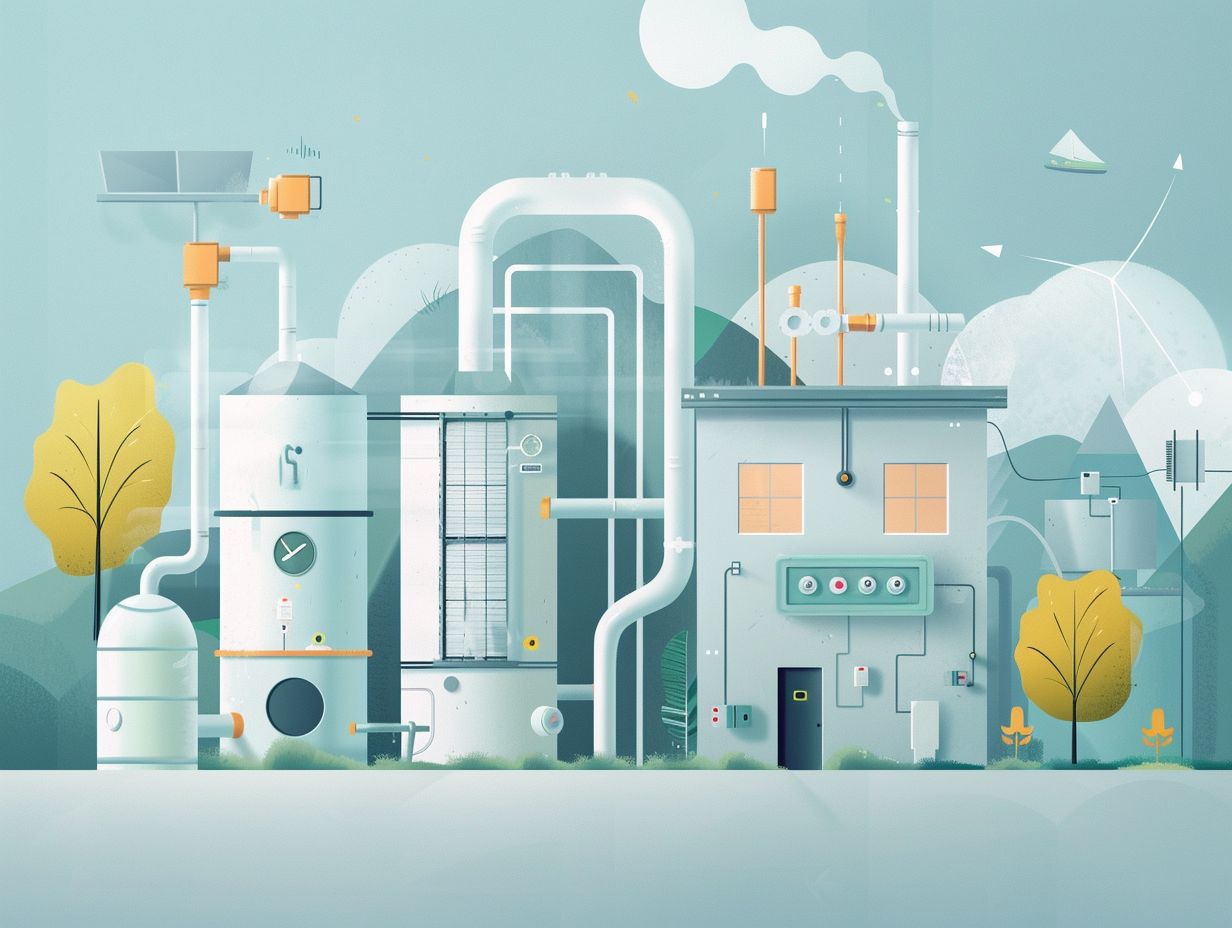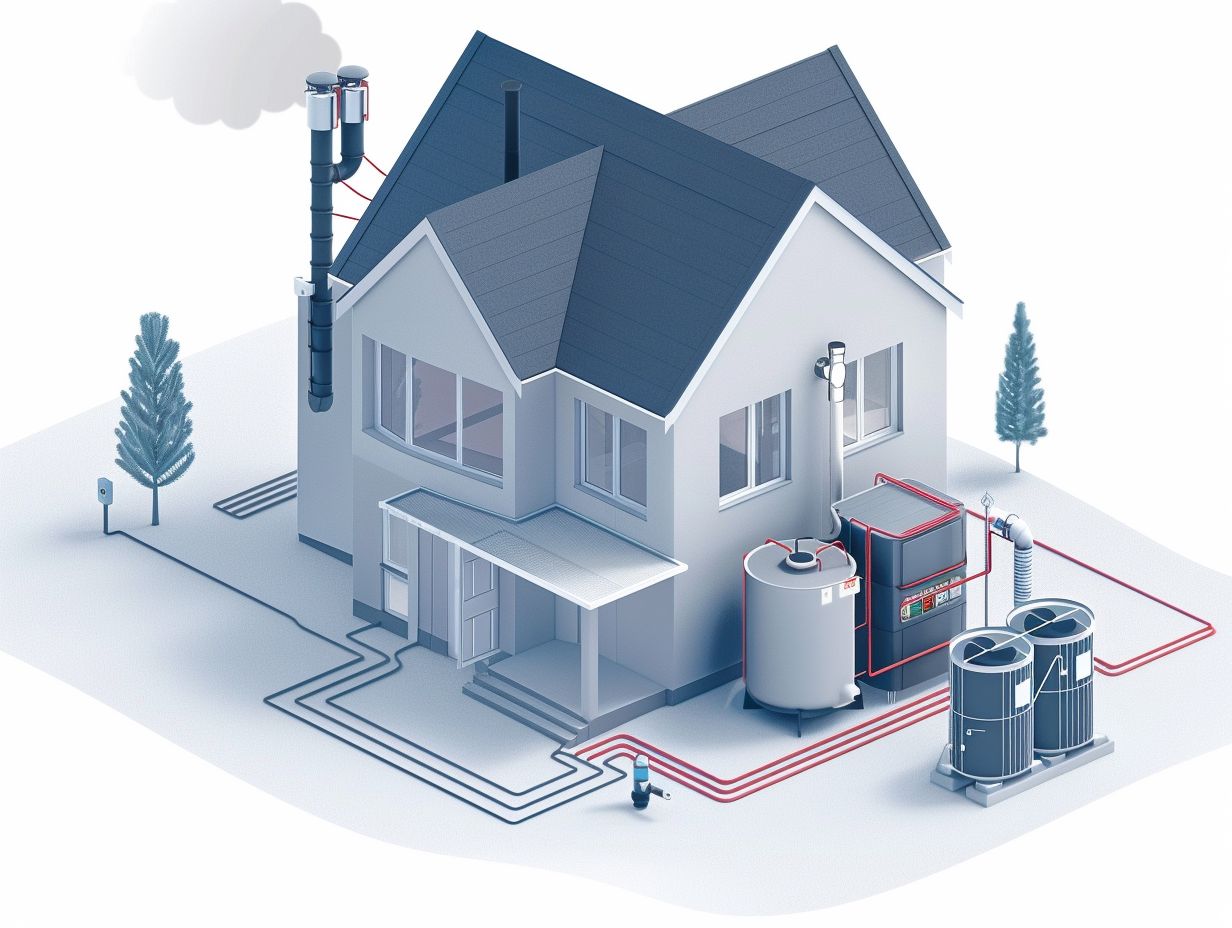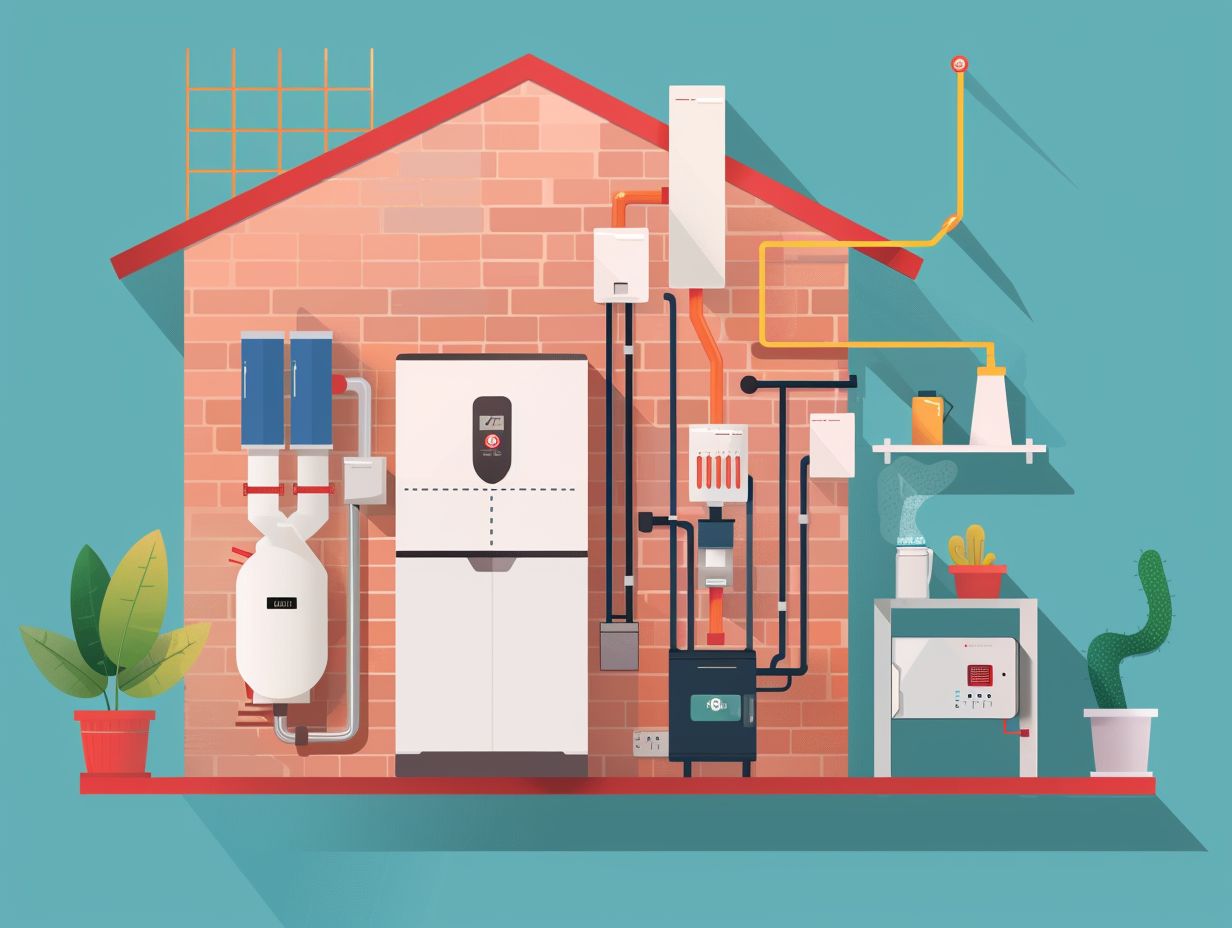Dual fuel heating systems are gaining popularity among homeowners seeking energy-efficient and environmentally friendly heating solutions. This article will examine the concept of dual fuel heating systems and compare them with other heating systems regarding their environmental impact.
Additionally, we will analyse the efficiency of dual fuel heating systems, including the energy savings and cost-effectiveness they provide. The article will also cover aspects like installation and maintenance procedures, fuel source availability, and regulatory considerations.
Continue reading to discover the advantages of dual fuel heating systems and determine if they are a suitable option for your residence.
Key Takeaways:

- Dual fuel heating systems combine the use of two energy sources, providing more flexibility and efficiency in heating.
- Compared to other heating systems, dual fuel heating systems have a lower environmental impact and can help reduce carbon emissions.
- Installing and maintaining dual fuel heating systems may require additional considerations and regulations, but they can lead to energy savings and cost-effectiveness in the long run.
Understanding Dual Fuel Heating Systems involves your integration of multiple heating technologies to provide efficient heating and cooling solutions for residential and commercial properties. Dual fuel heating systems combine the benefits of a heat pump and a gas furnace to offer optimal efficiency in varying climates and temperatures. The heat pump functions as your primary heat source, operating effectively in milder weather conditions by extracting heat from the outdoor air and transferring it inside.
When temperatures drop, the system switches to the gas furnace for more robust heating capability. This seamless transition between electric heat and gas heating ensures that your dual fuel system adapts to your specific needs, maximising energy efficiency. By utilising the strengths of each technology, dual fuel heating systems help reduce energy consumption and lower utility costs for homeowners and businesses.
What are Dual Fuel Heating Systems?
Dual Fuel Heating Systems are innovative heating solutions that combine the use of a heat pump with a gas furnace, providing you with dual-purpose functionality for efficient heating in various weather conditions. These systems operate by utilising the heat pump during milder weather when it is more energy-efficient, switching to the gas furnace as temperatures drop to ensure consistent and reliable warmth.
One of the key advantages of dual fuel heating systems is their versatility and cost-effectiveness. They offer the energy efficiency of a heat pump along with the heating power of a gas furnace, resulting in lower energy bills and reduced environmental impact. This hybrid approach maximises the heating capabilities, allowing homeowners like you to enjoy a comfortable indoor environment regardless of external temperatures.
Environmental Impact of Dual Fuel Heating Systems
The Environmental Impact of Dual Fuel Heating Systems should be a critical consideration when seeking sustainable and eco-friendly heating solutions. Dual fuel systems are designed to minimise energy wastage and decrease the environmental footprint associated with heating.
One of the primary benefits of dual fuel heating systems is their optimised energy consumption patterns. By combining gas and electricity, these systems provide a more efficient and balanced approach to heating.
The synergy between these two energy sources not only increases the heating system’s effectiveness but also lessens dependence on a single energy source, promoting a more diverse energy mix. This not only aids in addressing climate change but also fosters a more robust and dependable heating infrastructure.
Comparison to Other Heating Systems
When compared to traditional heating systems, Dual Fuel Heating Systems offer significant advantages in terms of energy efficiency, cost savings, and reliable performance. Their installation and operation can provide a high level of efficiency and comfort for residential and commercial properties.
One of the key differences between dual fuel heating systems and conventional systems lies in their ability to utilise two different energy sources, typically natural gas and electricity. This dual capability allows the system to dynamically switch between fuels based on factors like cost and availability, ensuring optimal efficiency and cost-effectiveness.
Dual fuel systems often boast higher heating efficiency ratings, leading to lower energy consumption and reduced heating costs over time. The equipment utilised in dual fuel systems is specifically designed to work seamlessly together, providing a reliable and consistent heating solution for various property types.
Benefits for the Environment

The benefits of Dual Fuel Heating Systems for the environment are significant. You can enjoy reduced energy consumption, lower utility bills, and minimal environmental impact with these systems. They are in line with energy trust initiatives and support sustainable heating practices.
Dual Fuel Heating Systems operate by utilising two energy sources, typically natural gas and electricity. This approach reduces reliance on a single fuel type and diversifies energy inputs. Not only does this enhance energy efficiency, but it also allows homeowners to adjust their heating strategy according to climate conditions.
By leveraging the strengths of both gas and electricity, dual fuel systems can achieve optimal performance while reducing greenhouse gas emissions. This contributes to a greener environment and has the potential to decrease carbon footprints.
Efficiency of Dual Fuel Heating Systems
The Efficiency of Dual Fuel Heating Systems is noteworthy for their capacity to adjust to changing heating needs while upholding peak efficiency.
Dual fuel heating systems feature top-tier efficiency components that facilitate smooth transitions between utilising two distinct fuel sources, like natural gas and electricity. These systems are engineered to automatically shift to the most cost-efficient fuel option according to prevailing energy prices, guaranteeing minimal energy usage and optimal savings for the user.
This adaptive feature proves particularly advantageous for households or businesses encountering fluctuating fuel prices or possessing specific heating needs during different seasons.
Energy Savings and Cost Effectiveness
Dual Fuel Heating Systems offer you substantial Energy Savings and Cost Effectiveness, making them a preferred choice for homeowners like you who are seeking to reduce heating costs and enhance energy efficiency. By optimising energy consumption, these systems lead to significant savings on your utility bills.
This innovative heating solution combines the benefits of both gas and electric heating, allowing you to switch between the two based on energy prices and efficiency levels. Dual fuel systems are designed to automatically activate the most cost-effective fuel source at any given time, ensuring that the heating process is both efficient and economical.
With the rising concerns about energy consumption and environmental impact, dual fuel heating systems provide you with an environmentally friendly option that not only reduces your carbon footprint but also contributes to long-term cost savings.
Installation and Maintenance of Dual Fuel Heating Systems
The installation and maintenance of Dual Fuel Heating Systems require professional expertise to ensure the system operates at optimal efficiency throughout the heating season. It is essential for you to choose the right system and schedule regular maintenance to maximise performance and longevity.
Having a professional install and maintain your dual fuel heating system can make a significant difference in its overall efficiency and lifespan. Proper installation ensures that the system operates seamlessly, minimising potential breakdowns and maximising energy efficiency.
Regular maintenance checks are crucial for identifying any potential issues early on and keeping the system running smoothly. Quality service providers offer free estimates, allowing homeowners to plan and budget effectively for their heating system needs.
By investing in professional installation and regular maintenance, you not only enhance the performance of your dual fuel heating system but also increase its longevity.
Process and Considerations
When installing and maintaining dual fuel heating systems, you must consider a series of processes and factors. These include:
- Evaluating the heating equipment
- Minimising energy waste
- Enhancing heating efficiency
- Ensuring proper insulation in the home
- Selecting the appropriate heating source
First and foremost, when assessing heating equipment for a dual fuel system, it is essential to evaluate the compatibility and condition of the existing components. This step involves inspecting the furnace, heat pump, or any other heating units to determine if they can effectively operate together within the dual fuel setup.
Subsequently, in order to reduce energy waste, homeowners should prioritise implementing energy-efficient practices such as using programmable thermostats, adhering to regular maintenance schedules, and sealing air leaks.
Improving insulation within the home is another critical consideration as it aids in heat retention and diminishes energy loss.
Lastly, selecting the optimal heating source involves considering factors like cost, availability, and environmental impact to make a well-informed decision.
Other Factors to Consider

When considering dual fuel heating systems, it is important to take into account factors beyond just efficiency and performance. The availability and accessibility of fuel sources, compliance with regulations and restrictions, and the environmental impact of using gas or propane as heating sources are all aspects that should be considered.
The availability and accessibility of fuel sources are critical in determining the practicality of dual fuel heating systems. If one fuel source is more easily obtainable than the other, it can affect the overall cost and convenience of the system.
Additionally, ensuring compliance with local regulations and restrictions is necessary to guarantee the safety and legality of the installation. It is also essential to consider the environmental implications of using gas or propane, as each fuel type varies in heating power and environmental impact.
Finding a balance between heating efficiency and minimising environmental impact is crucial when making a well-informed decision about dual fuel heating systems.
Availability and Accessibility of Fuel Sources
The availability and accessibility of fuel sources play a critical role in the viability of dual fuel heating systems, as reliable access to gas service and diverse energy sources ensures uninterrupted heating capabilities and optimal system performance.
When operating a dual fuel heating system, you heavily rely on the consistent availability of fuel sources, especially gas service, as it serves as a primary energy source.
Alongside gas, having access to a variety of energy sources like electricity or oil provides flexibility and resilience in heating operations. This diversity guarantees that the system can adapt to different conditions, maintaining efficiency and comfort for residents during colder months.
Thus, a robust network of fuel sources is essential for the seamless functionality of dual fuel heating systems.
Regulations and Restrictions
It is crucial for you to understand the Regulations and Restrictions governing the usage of dual fuel heating systems, particularly concerning the use of gas or propane, in order to ensure compliance with environmental standards and energy trust initiatives.
The objective of these regulations is to alleviate the environmental impact of heating systems by advocating for the use of cleaner energy sources and reducing greenhouse gas emissions. For example, restrictions on emissions from combustion processes assist in managing air pollution and improving air quality.
Adhering to energy trust guidelines guarantees that heating systems are energy-efficient, contributing to overall conservation endeavours. The regulatory framework also plays a pivotal role in promoting the adoption of alternative energy technologies, such as heat pumps and solar heating, which are more sustainable and environmentally friendly.
Frequently Asked Questions
Are dual fuel heating systems environmentally friendly?

Yes, dual fuel heating systems can be considered environmentally friendly depending on the type of fuel used. Some dual fuel systems incorporate renewable energy sources, such as solar or geothermal, which have minimal impact on the environment.
How do dual fuel heating systems benefit the environment?
Dual fuel heating systems can benefit the environment by reducing reliance on non-renewable energy sources and decreasing carbon emissions. They can also help to conserve natural resources and promote sustainability.
Do dual fuel heating systems save energy?
Yes, dual fuel heating systems can save energy by using the most efficient fuel source for a given temperature range. This can result in lower energy consumption and reduced utility costs.
What are the drawbacks of dual fuel heating systems?
The main drawback of dual fuel heating systems is the initial cost of installation, which can be higher than traditional single-fuel systems. Additionally, regular maintenance is required for both fuel sources, which can add to the overall cost.
Are there any incentives for using dual fuel heating systems?
Yes, there are often government incentives, rebates, or tax credits available for using dual fuel heating systems. These incentives vary by location and can help offset the initial cost of installation.

